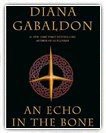Outlander aka Cross Stitch - Gabaldon Diana (читать книгу онлайн бесплатно полностью без регистрации .TXT) 📗
Our performance was greeted with rapturous applause, and the Gypsies reciprocated, a young man singing some sort of wailing lament to the accompaniment of an ancient fiddle. His performance was punctuated by the crashing of a tambourine, wielded with some gravity by a little girl of about eight.
While Murtagh had been circumspect in his inquiries in the villages and crofts we visited, with the Gypsies he was entirely open. To my surprise, he told them bluntly who we sought; a big man, with hair like fire, and eyes like the summer skies. The Gypsies exchanged glances up and down the aisle of the caravan, but there was a unanimous shaking of regretful heads. No, they had not seen him. But… and here the leader, the purple-shirted young man who had welcomed us, pantomimed the sending of a messenger, should they happen across the man we sought.
I bowed, smiling, and Murtagh in turn pantomimed the handing across of money for information received. This bit of business was greeted with smiles, but also with gazes of speculation. I was glad when Murtagh declared that we could not stay the night, but must be on our way, thank ye just the same. He shook out a few coins from his sporran, taking care to exhibit the fact that it held only a small handful of coppers. Distributing these by way of thanks for the supper, we made our exit, followed by voluble protestations of farewell, gratitude, and good wishes – at least that’s what I assumed they were.
They might actually have been promising to follow us and cut our throats, and Murtagh behaved rather as though this had been the case, leading the horses at a gallop to the crossroads two miles distant, then ducking aside into the vegetation for a substantial detour before reemerging onto the road again.
Murtagh glanced up and down the road, empty in the fading, rain-soaked dusk.
“Do you really think they followed us?” I asked curiously.
“I dinna ken, but since there’s twelve o’ them, and no but the twa o’ us, I thought we’d best act as though they did.” This seemed sound reasoning, and I followed him without question through several more evasive maneuvers, arriving at last in Rossmoor, where we found shelter in a barn.
Snow fell the next day. Only a light fall, enough to dust the ground with a white like the flour on the millhouse floor, but it worried me. I didn’t like to think of Jamie, alone and unsheltered in the heather, braving winter’s storms in nothing but the shirt and plaid he had been wearing at his capture by the Watch.
Two days later, the messenger came.
The sun was still above the horizon, but it was evening already in the rockwalled glens. The shadows lay so deep under the leafless trees that the path – what there was of one – was nearly invisible. Fearful of losing the messenger in the gathering dark, I walked so closely behind him that once or twice I actually trod on the trailing hem of his cloak. At last, with an impatient grunt, he turned and thrust me ahead of him, steering me through the dusk with a heavy hand on my shoulder.
It felt as though we had been walking for a long time. I had long since lost track of our turnings amid the towering boulders and thick dead undergrowth. I could only hope that Murtagh was somewhere behind, keeping within earshot if not within sight. The man who had come to the tavern to fetch me, a middle-aged Gypsy with no English, had flatly refused to have anyone but me accompany him, pointing emphatically first at Murtagh and then the ground, to indicate that he must stay put.
The night chill came on fast at this time of year, and my heavy cloak was barely enough protection against the sudden gusts of icy wind that met us in the open spaces of the clearings. I was torn between dismay at the thought of Jamie lying through the cold, wet nights of autumn without shelter, and excitement at the thought of seeing him again. A shiver ran up my spine that had nothing to do with the cold.
At last my guide pulled me to a halt, and with a precautionary squeeze of my shoulder, stepped off the path and disappeared. I stood, as patiently as could be managed, hands folded under my arms for warmth. I was sure my guide – or someone – would return; I hadn’t paid him, for one thing. Still, the wind rattled through the dead brambles like the passing of a deer’s ghost, still in panic-stricken flight from the hunter. And the damp was seeping through the seams of my boots; the otter-fat waterproofing had worn away, and I’d had no chance to reapply it.
My guide reappeared as suddenly as he had left, making me bite my tongue as I stifled a squeak of surprise. With a jerk of his head, he bade me follow him, and pressed aside a screen of dead alders for me to pass.
The cave entrance was narrow. There was a lantern burning on a ledge, silhouetting the tall figure that turned toward the entrance to meet me.
I flung myself forward, realizing even before I touched him that it was not Jamie. Disappointment struck me like a blow in the stomach, and I had to step back and swallow several times to choke back the heavy bile that rose in my throat.
I clenched my hands at my sides, digging my fists into my thighs until I felt calm enough to speak.
“Rather out of your territory, aren’t you?” I said, in a voice that surprised me by its coolness.
Dougal MacKenzie had watched my struggle for control, not without some sympathy on his dark face. Now he took my elbow and led me farther into the cave. There were a number of bundles piled against the far side, many more than a single horse could carry. He wasn’t alone, then. And whatever he and his men carried, it was something he preferred not to expose to the curious gaze of innkeepers and hostlers.
“Smuggling, I suppose?” I said, with a nod toward the bundle. Then I thought better and answered my own question. “No, not exactly smuggling – goods for Prince Charles, hm?”
He didn’t bother to answer me, but sat down on a boulder opposite me, hands on his knees.
“I’ve news,” he said abruptly.
I took a deep breath, bracing myself. News, and not good news, from the expression on his face. I took another breath, swallowed hard, and nodded.
“Tell me.”
“He’s alive,” he said, and the largest of the ice lumps in my stomach dissolved. Dougal cocked his head to one side, watching intently. To see whether I were going to faint? I wondered dimly. It didn’t matter; I wasn’t.
“He was taken near Kiltorlity, two weeks ago,” Dougal said, still watching me. “Not his fault; poor luck. He met six dragoons face-to-face round a turn in the path, and one recognized him.”
“Was he hurt?” My voice was still calm, but my hands were beginning to shake. I pressed them flat against my legs to still them.
Dougal shook his head. “Not as I heard.” He paused a moment. “He’s in Wentworth Prison,” he said reluctantly.
“Wentworth,” I repeated mechanically. Wentworth Prison. Originally one of the mighty Border fortresses, it had been built sometime in the late sixteenth century, and added to at intervals over the next hundred and fifty years. The sprawling pile of rock now covered nearly two acres of ground, sealed behind three-foot walls of weathered granite. But even granite walls have gates, I thought. I looked up to ask a question, and saw the reluctance still stamped on Dougal’s features.
“What else?” I demanded. The hazel eyes met mine, unflinching.
“He stood his trial three days ago,” Dougal said. “And was condemned to hang.”
The ice lump was back, with company. I closed my eyes.
“How long?” I asked. My voice seemed rather far-off to my own ears and I opened my eyes again, blinking to refocus them in the flickering lantern light. Dougal was shaking his head.
“I dinna ken. Not long, though.”
My breath was coming a little easier now, and I was able to unclench my fists.



